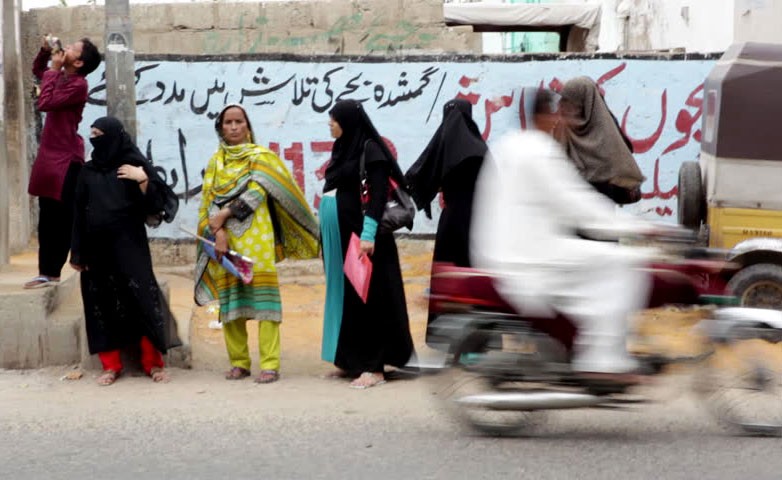
It is still challenging for some women to step out of their home for work or even for everyday chores

While women in Pakistan may have reclaimed some of their lost space to social taboos and patriarchy, it is still quite a task for many women, especially girls, to step out of their homes for as ordinary a chore as going to the nearby market or see a classfellow living only a few houses down the lane.
They blame it on the man in the street, "It is as if they have never seen a woman in their life," says Saima Ali, a third-year student based in Lahore. "And a girl ends up thinking she has committed a sin to have come out of her home. That is why our mother does most of the shopping for us and whenever we sisters have to go out we go with our brother on the bike," she says.
It is not just ogling, "Women encounter men in bazaars who it seems have come with the sole purpose of harassing women physically. They should be checked and punished," she says. "But many women have no option but to get used to the situation and remain silent."
There are others who are not ready to take things as they are, "Many of us have to entirely depend on our husband or brother to take us to a relative’s place or to a market," says Uzma Yaseen, a housewife. "There is no proper public transport. I simply fail to understand how one can avail a ride on these red buses. They say a card has to be acquired from somewhere. I don’t know if the red bus is available for a destination I want to go to," she says.
It has never been easy for women to claim their space in our society to come out and work. "I have mostly used my own car to commute but back in 2005 when I moved cities for work, I used public transport for a few months. It was really an eye-opening experience," says Mehmal Sarfraz, a journalist. "Running after a bus or getting pushed, and sometimes being felt up, by men while trying to get on the bus and then standing throughout the journey to work on the days you didn’t get a seat (it was more than an hour’s commute with the bus stopping at every possible stop to pick up more passengers) was not just tiring, but made even more unpleasant due to someone casually touching you or staring at you," she adds.
She rightly says that "It’s quite difficult to explain what a woman goes through in her day-to-day life due to these issues; when your body and space is violated and you are somehow conditioned to accept it as a given if you step out of your house."
Ume Laila Azhar, a social activist working on women’s issues, explains what compromises a woman’s right to mobility, "Women employed in formal work in Pakistan face issues in travelling to work safely. Workplaces are generally not women-friendly. Organisations need to ensure that workplaces are free of harassment." Azhar raises a very important point when she says that, "in Pakistan social vulnerability juxtaposed with economic vulnerability keeps women underpaid and overworked, even when they overcome structural and social barriers."
It is interesting to find out that as many women complain about their inability to freely move around, others either do not find any problem or have resigned to things as they are. Nazeeran Bibi is a middle-aged helper in a housing society. She is dropped at the gate of the society in a motorcycle rickshaw and is picked up in the afternoon. "I can go wherever I want to go. These motorcycle rickshaws ply on many small routes in the whole city. One just has to have the information," she says. Nazeeran is not particularly concerned about how men behave with women who are out, "Men who are mean do what they do. I don’t really care. I have to do my work and earn a living for my children," she says. Nazeeran points to the duality. "Men claim they greatly respect their women at home. I don’t know what happens to them as soon as they see a stranger woman in a street or in a bazaar," she exclaims.
Read also: Veiled moves
Samreen Jamil, a housewife, only partly agrees with the notion that it is very difficult for women to be as free to come out of their homes as men are, "Time has brought many changes to the Pakistani society and has contributed a lot towards women’s empowerment and dignity. I think as a woman our role in the society varies, each phase brings a different challenge and experience," she believes.
"As a student, a girl, you might face a lot more difficulties than a working lady or a mother. Harassment or conveyance issues have been part of everyone’s life at one time or the other. Fortunately, recent years have given us freedom from some issues but completely ending them is still not possible."
"As a housewife, and former working woman, I usually don’t face any difficulties while moving out of the house. For me being sure-footed and aware is the key towards a better experience of going out."